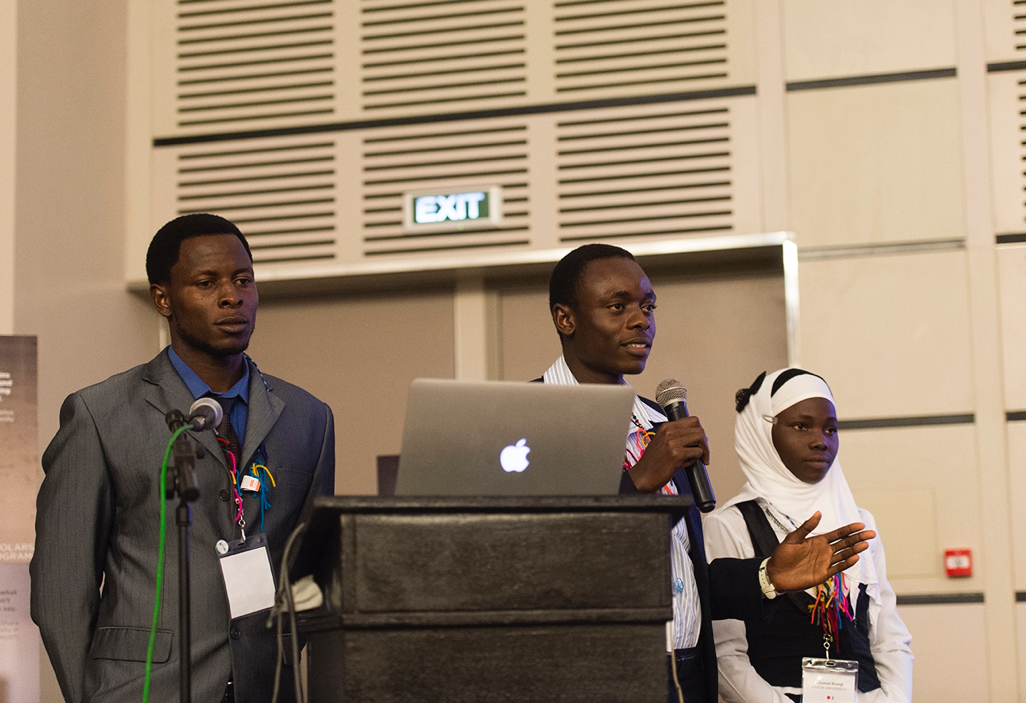
UNEGA Integrated Farm: Value Addition for Development of Smallholder Farmers in Uganda
2016 Resolution Social Venture Challenge Winner
In Africa, agriculture plays a significant role in the lives of the poor, who remain primarily rural and are either directly engaged in farming, or dependent on farming-related activities. This is particularly true in Uganda, where 80 percent of the population live in rural areas and rely on subsistence farming. Increasing farm yields through improved practices and techniques can significantly improve the health and well-being of many rural communities.
The UNEGA Integrated Farm in Wakiso, Uganda, aims to do just that.
A social entrepreneurship project developed by MasterCard Foundation Scholars and students at EARTH University, UNEGA will encourage rural community development through the education and demonstration of modern, sustainable farming techniques. Alex Kyeyune, Fatumah Birungi and Paul Mukuye represented the initiative at the Resolution Social Venture Challenge in Accra in June this year, where they won the challenge. In addition to Alex, Fatumah and Paul, the UNEGA team consists of fellow Scholars, Alex Mukiibi, Agil Katumanyane, Caroline Akampa, Chirstopher Mujjabi, and fellow EARTH student, Tom Okot.
One of UNEGA’s key efforts will be to teach micro-gardening techniques, including vertical, pyramid and bio intensive farming; all methods designed to maximize the amount of crop output in a limited amount of space. These techniques can help double or even triple yields without increasing the amount of land required for cultivation; perfect for areas where land is scarce. What’s more, crops grown vertically can survive well in the ashy soil found near the country’s many volcanoes.
The eco-friendly micro-gardens will be created and managed using recyclable materials including plastics, old tires, and bags. Soil will be enriched with compost generated from household waste, reducing reliance on fertilizer. The gardens will be nourished with captured rainwater and drip irrigation, alleviating demand on water supplies.
Fatumah explains, “Micro-gardens as our solution fosters a sustainable way of production in that one can use recyclable resources to obtain something valuable. Farmers use the materials available in their surroundings so as to double and triple their incomes, as well as source of food.”
The micro-gardens will improve the quality of food grown by farmers in Wakiso, increasing food and nutrient security for families. Because of increased yields, surplus vegetables can be sold for additional income.
Alex outlines the vision of UNEGA, “We will rent land so that we can establish and start micro-gardening at our demonstration farm. Our target population will be able to learn about micro-gardening and then implement what they have learned. Very soon they will start producing, allowing them to improve on their diet, and sell the surpluses so as to earn some money. With time, their profits will emerge and we shall equip them with saving skills. This will open room for expansion of their micro-gardening to a larger scale, hence life improvement and development.”
The UNEGA team has already begun testing its model at EARTH University in Costa Rica. Piloting the program has helped the team troubleshoot and prepare the initiative for a smooth transfer to Uganda.
All three Scholars intend to use their learnings from the UNEGA initiative to help teach their peers about the process of actualizing an idea into an actionable, sustainable business plan. Said Paul, “After the fellowship, we plan to come back to our university and share what we have learned, and lay strategies on how all our fellow students will be able to give back to their communities.”
UNEGA’s outcomes are well-defined: to attract young people to farming by teaching new techniques involving technology, by illustrating the job opportunity and entrepreneurial potential of agricultural development. Paul, Fatumah, and Alex plan to define success by determining how many of those trained on the farming techniques taught at UNEGA are able to begin their own, independent farming efforts; and to turn those efforts into doubled or tripled incomes.
The UNEGA team has set themselves a milestone: by 2025, UNEGA wants to see micro-gardens for all families, and agribusiness farms that produce high quality products that are safe for consumers and that respect and protect the environment. UNEGA Integrated Farm focuses on women empowerment, youth entrepreneurship and involvement in agriculture both to serve as an example as well as raise awareness about the profitability and the nobility of the profession.
This is the fifth post in a series from The MasterCard Foundation Scholars Program to highlight winners of the Resolution Social Venture Challenge that occurred at the Baobab Summit in Ghana in June 2016.



